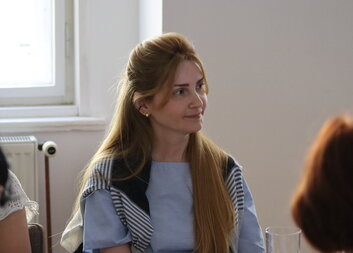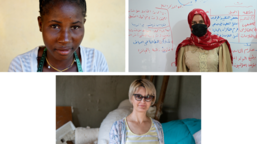Inga Zarandia, a dedicated advocate for early childhood development in Georgia, helps children that require specific support to receive the same chances as everyone else. Recently, she traveled to the Czech Republic with a study group organised by Caritas Czech Republic to explore new approaches and share experiences in the field. In this interview, Inga reveals the valuable insights she gained and how they will enhance early childhood services in Georgia.
You work in the early childhood development in Georgia. What exactly is your role in the field?
I am the head of the Habilitation and Development Center in Batumi, which is located in the southwest of Georgia. For over a decade, we have been supporting children with developmental delays and those at risk, together with their families. Our centre is important in providing early development services to make sure these children receive the best start in life.
I also co-founded and currently serve on the board of the Coalition for Early Childhood Development, where we focus on raising awareness about issues in the field or training early development specialists. All this helps to promote early development services in Georgia.
Given the coalition's clear goals for the future, could you provide an update on the current state of early childhood development services across Georgia?
Georgia started its early childhood development programme in 2011 with the help of international experts. This programme is managed by the Ministry of Health and aims to support children from birth to age 7 who face developmental challenges or are at risk.
Specialists work with children in their natural environments, such as homes or kindergartens, and focus on each child's individual needs and support to their families. Although the programme is available in most regions of Georgia, the access remains limited in remote and mountainous areas because of geographical challenges and difficulties in transportation for specialists.
You recently visited the Czech Republic to learn about various early care practices and compare experiences in the field. What did you find out?
During our visit to the Czech Republic, we studied their Early Care system, which differs significantly from ours in Georgia. It was enlightening to observe their approach to the topic, as well as their practical experiences in childcare. We also appreciated their emphasis on supporting parental well-being, which is important for the overall well-being of children and a concept we are eager to implement more effectively in Georgia.
Was there anything that surprised you during the visit?
One of the most surprising aspects was the Czech Republic's extensive support system for parents, including psycho-emotional support services. This approach is something we strive to include in Georgia, as it plays an important role in supporting families of children that require specific support.
You have mentioned some difficulties already, but what are the other major challenges in early childhood development in Georgia?
One of the biggest challenges is the difficulty in providing early intervention services in kindergartens and schools. This often delays support for children, who may not enter the programme until as late as age 7. The situation places a heavy workload on our specialists, which leads to burnout and a high turnover rate.
Budget constraints further impact the programme's effectiveness, which means that many specialists prefer working in private sectors rather than government-funded services. This leaves us with even less specialists.
How does Caritas Czech Republic help with these challenges?
Caritas Czech Republic has played a vital role in supporting children with developmental disorders in Georgia since 2015. Thanks to funding from the Czech Development Agency, they have significantly improved autism services across many regions. Our centre in Adjara has benefited greatly from their support through specialist training and quality supervision.
Currently, Caritas Czech Republic is training new early intervention specialists to help us reach more children who are still waiting for support. Their collaboration with us and other stakeholders, including the Ministry of Health, is crucial in improving early development services across the country.
With all the efforts that have been invested, have you seen any improvements in recent years?
Yes, there have been positive developments, especially since 2022 when the Ministry of Health started funding supervision components within the Early Childhood Development programme. This funding has greatly improved the support through specialists and the overall quality of early intervention services provided to children and their families.
You already mentioned some future plans. What are the long-term goals for early childhood development in Georgia?
Our coalition's long-term goals are to expand the access to services in all regions of Georgia, including the remote mountainous areas where the access is currently limited. We also aim to strengthen the collaboration with kindergartens to integrate quality early intervention for children aged 3 and above, both at home and in their natural educational environment.
Additionally, increasing the number of trained early childhood education providers is necessary, and we appreciate the support from Caritas Czech Republic and the Czech government in achieving these goals.
Returning to the study visit to the Czech Republic, how do you think the visit will benefit your work?
The study visit provided us with valuable insights and ideas for improving our early intervention and inclusive education services in Georgia. It allowed us to exchange experiences with experts and officials, shaping our ideas for future development. We are now focused on realising this knowledge to improve our services and ensure that every child in Georgia receives the support they need.
Thank you for the Interview.
Help with us and donate.
We would like to express our sincere gratitude to the following organisations and centres for hosting us during our study visit: Cortex Neuro Centre, Fakultní mateřská škola se speciální péčí, Společnost pro ranou péči Praha, Raná péče Diakonie, NAUTIS.
Your support and insights were invaluable.













